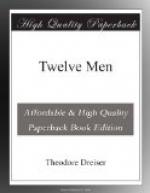The young doctor, meditating on all that was new or faddistic, decided at last that just for variation’s sake he would give the doctor something of which he had only recently heard, a sample of which he had with him and which had been acclaimed in the medical papers as very effective. Without asking the doctor whether he had ever heard of it, or what he thought, he merely prescribed it.
“Well, now, I like that,” commented Gridley solemnly. “I never heard of that before in my life, but it sounds plausible. I’ll take it, and we’ll see. What’s more, I like a young doctor like yourself who thinks up ways of his own—” and, according to his daughter, he did take it, and was helped, saying always that what young doctors needed to do was to keep abreast of the latest medical developments, that medicine was changing, and perhaps it was just as well that old doctors died! He was so old and feeble, however, that he did not long survive, and when the time came was really glad to go.
One of the sweetest and most interesting of all his mental phases was, as I have reason to know, his attitude toward the problem of suffering and death, an attitude so full of the human qualities of wonder, sympathy, tenderness, and trust, that he could scarcely view them without exhibiting the emotion he felt. He was a constant student of the phenomena of dissolution, and in one instance calmly declared it as his belief that when a man was dead he was dead and that was the end of him, consciously. At other times he modified his view to one of an almost prayerful hope, and in reading Emily Bronte’s somewhat morbid story of “Wuthering Heights,” his copy of which I long had in my possession, I noted that he had annotated numerous passages relative to death and a future life with interesting comments of his own. To one of these passages, which reads:
“I don’t know if it be a peculiarity with me, but I am seldom otherwise than happy while watching in the chamber of death, provided no frenzied or despairing mourner shares the duty with me. I see a repose that neither earth nor hell can break, and I feel an assurance of the endless and shadowless hereafter—the eternity they have entered—where life is boundless in its duration, and love in its sympathy, and joy in its fullness,”
he had added on the margin:
“How often I have felt
this very emotion. How natural I know it to
be. And what a consolation
in the thought!”
Writing a final prescription for a young clergyman who was dying, and for whom he had been most tenderly solicitous, he added to the list of drugs he had written in Latin, the lines:
“In life’s closing
hour, when the trembling soul flies
And death stills
the heart’s last emotion,
Oh, then may the angel of
mercy arise
Like a star on
eternity’s ocean!”
When he himself was upon his death-bed he greeted his old friend Colonel Dyer—he of the absent overcoat and over-shoes—with:




